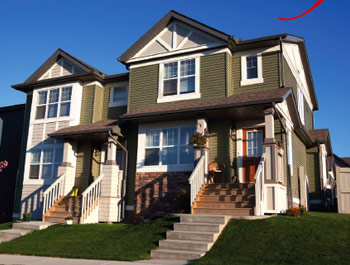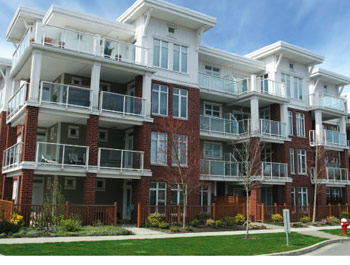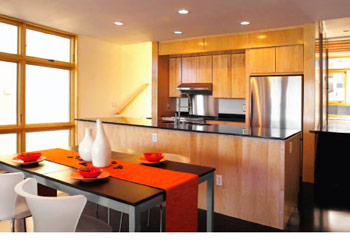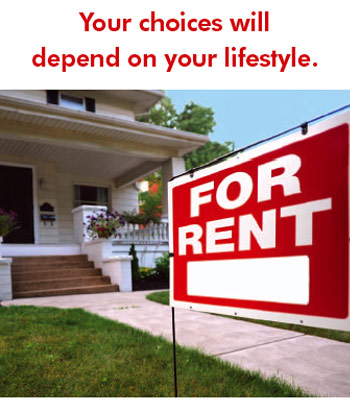Find a New Lease on Life in Atlanta
The Benefits of Renting a Home
 If you’re moving to Atlanta, you probably assume that your first step is to buy a house, townhome or condo. However, given the “perfect storm” in the real estate market today—where an unusual number of homes are being offered for rent and many renters are seeking roommates or even moving back home—more units are available to lease than usual, and you may be able to find a bargain in the process. So before you make a final decision about where to live and what home to buy, you may want to consider your options in leasing.
If you’re moving to Atlanta, you probably assume that your first step is to buy a house, townhome or condo. However, given the “perfect storm” in the real estate market today—where an unusual number of homes are being offered for rent and many renters are seeking roommates or even moving back home—more units are available to lease than usual, and you may be able to find a bargain in the process. So before you make a final decision about where to live and what home to buy, you may want to consider your options in leasing.
What are the advantages of leasing? Leasing holds considerable attraction for newcomers, according to John and Nick Suarez. The two brothers, owners of Atlanta Real Estate and Property Management, believe that new residents who give themselves a little breathing room to check out the area are making the smart move in the long run. “There are numerous advantages,” says John. “It gives newcomers an opportunity to get their feet wet, and to know more about the area before they buy. For someone coming into town, buying a home is a big decision. [With leasing], they have a much better opportunity to discover, explore and investigate.
 “With the economy the way it is, no one knows when we’re going to see things drastically improve,” he continues. “The housing floor hasn’t been reached yet, so it also gives them the time to get their house sold at a reasonable price. In some instances, people are hiring us to manage their homes in order to weather the storm, so that they don’t have to sell the home at a drastic reduction.” Buying also isn’t the easy choice it was during the past decade, notes Nick: stringent new requirements, including at least a 10% down payment for most buyers, make purchasing more challenging.
“With the economy the way it is, no one knows when we’re going to see things drastically improve,” he continues. “The housing floor hasn’t been reached yet, so it also gives them the time to get their house sold at a reasonable price. In some instances, people are hiring us to manage their homes in order to weather the storm, so that they don’t have to sell the home at a drastic reduction.” Buying also isn’t the easy choice it was during the past decade, notes Nick: stringent new requirements, including at least a 10% down payment for most buyers, make purchasing more challenging.
Randal Lautzenheiser, managing broker and one of the owners of Atlanta Intown Real Estate Services, agrees that leasing can be the right choice for newcomers. “They really get to know the city by living in it, and the area they think they want to live in,” he says.
Choosing to lease an apartment can have many advantages, according to Ann Hilson, owner and president of Leasing Luxury and LeasingLuxury.com, an apartment referral service. “Many apartments have so many amenities: pool, workout facilities, business centers with computers, fax, and printers, conference rooms for residents’ use, laundry service, dry cleaning pick-up and delivery and movie theaters are just some examples,” she says.
Amenities abound at high-rises and complexes throughout Atlanta. The Post Biltmore, located in Midtown, features studio, one- and two-bedroom with community amenities including a fountain courtyard, rooftop terrace, fitness center, controlled access parking and storage units. For a completely different, more suburban feel, Gwinnett County’s Gables Sugarloaf offers perks including a landscaped park with picnic and grilling areas, a swimming pool with tiered waterfall and lighted tennis courts.
 As with any large metropolitan area, monthly rents in Atlanta cover a broad range. According to Hilson, someone in the Buckhead/Midtown/Downtown area could expect to pay from $700 and up for a studio or one-bedroom all the way to around $5,000 for the most lavish three-bedroom digs. (Most would average around $2,000, she adds.) Dunwoody residents pay around $500 for a studio or one-bedroom up to $2,000 for two and three-bedroom apartments.
As with any large metropolitan area, monthly rents in Atlanta cover a broad range. According to Hilson, someone in the Buckhead/Midtown/Downtown area could expect to pay from $700 and up for a studio or one-bedroom all the way to around $5,000 for the most lavish three-bedroom digs. (Most would average around $2,000, she adds.) Dunwoody residents pay around $500 for a studio or one-bedroom up to $2,000 for two and three-bedroom apartments.
In the suburbs, rent for a two-bedroom apartment would generally range from $750 to $1,000, while three bedrooms would start at $800 to $900 and up. In Marietta, located west of the city in Cobb County, a studio or one-bedroom would start in the mid to upper $300s, while two and three-bedrooms would cost somewhere in the mid-teens. Jonesboro rents would start at around $500 for smaller spaces and range up to the low teens for two- and three-bedrooms. The Smyrna/Vinings area would be just slightly higher, varying from the mid to upper $500s to the low to mid-teens. In Alpharetta and Roswell, expect to pay anywhere from the low to mid $600s to the mid-teens, while Decatur rents would range from the low to mid $600s up to around $2,000. Hilson adds that there are always exceptions to these ranges, and rents in specific areas could be higher or lower.
 Where to Lease?
Where to Lease?
Atlanta offers an array of potential locations for new residents, and your choices will depend on your lifestyle. Someone who is young and single with no children would probably enjoy the Buckhead area. For families, the choices will often depend on proximity to good schools, and couples with children will often prefer a quieter neighborhood. New residents who wish to avoid Atlanta’s traffic may want to live within walking distance of a MARTA station. (MARTA is metro Atlanta’s rapid transit system. Cobb, Clayton and Gwinnett counties offer bus systems within the boundaries of each individual county.)
Personal preference also plays a strong role in determining which area is right for you. “It’s a lifestyle choice,” says Lautzenheiser. “Some people just prefer the space of a single family house, and others just prefer the views of a high-rise. You don’t have to maintain the house [when you lease], but often, you will have to take care of the lawn. On high-end leases, the landlord will take care of that as well.”
 Helpful Tips
Helpful Tips
If you’re planning to lease a house, John Suarez recommends dealing with professionals who are governed by a code of ethics. Professionals also must maintain a certain level of conduct in order to obtain and keep their licenses. “Not that there aren’t individual home owners who make fabulous landlords, but we’re held accountable,” he notes. “A private individual can’t be held accountable except in court.”
The uncertainty of the current real estate market also dictates caution when it comes to your deposit, Lautzenheiser believes: “Newcomers should make sure they have their deposit held by the real estate company, because so many properties are going into foreclosure, that if the owner goes into foreclosure they may never see [the deposit again].”
Research is critical to a successful choice. Hilson suggests considering what you must have versus what you would like to have, checking on the costs of utilities and, if you’re choosing an apartment, whether utilities are included in your rent. She advises that you average your expected costs to arrive at a tentative budget.
This isn’t the time to be a shrinking violet, she adds: “Don’t be afraid to ask questions. Ask about commute time or the nearest transportation. Use reasoning and a little caution. If a deal seems too good to be true, it could be. Ask!”
With so many choices of homes, apartments and corporate lodging here in metro Atlanta, there should be something for everyone who wants to lease rather than buy. All it takes it a little research to determine which option is best for you.
THE LEASING ALTERNATIVE
Corporate Lodging is another great way to explore an area of Atlanta before making a long-term housing commitment. After 15 years in the business, Tim Miller of TP Corporate Lodging has great advice for people trying to decide where to live. Here are some Tips for Choosing Temporary Housing and Leasing Accommodations.
1) Avoid or be very wary about leasing accommodation from individuals. Many people have investment property or condos that they can’t sell in this market. They turn them into rental properties and offer them for a very low price. Unfortunately some of them take the lease money and don’t pay the mortgage—the next thing the tenant knows is that they are being evicted!
2) Deal directly with a company based in the city you want to lease in. Out-of-state companies don’t always know the areas of the city and could send you to unsafe neighborhoods.
3) Extended-stay hotels are very often cheaper than corporate lodgings but you usually have to sacrifice living space, the clientele may not be as good, and you could be in neighborhoods you don’t feel safe in.
4) Corporate lodgings will often perform criminal background checks on their clientele. In this economy, extended-stays are turning into permanent-stays and can result in less desirable tenants.
5) Before you commit to lodging, if you have a pet, find out if the pet is welcome. Some places have weight limits or do not allow them at all.
6) Find out how old the property is. Do you want to deal with a 20-year-old kitchen?
7) Find the deals—there are lots of them right now!
For more information, contact TP Corporate Lodging at 678-442-9700 or www.tpcorporatelodging.com.







